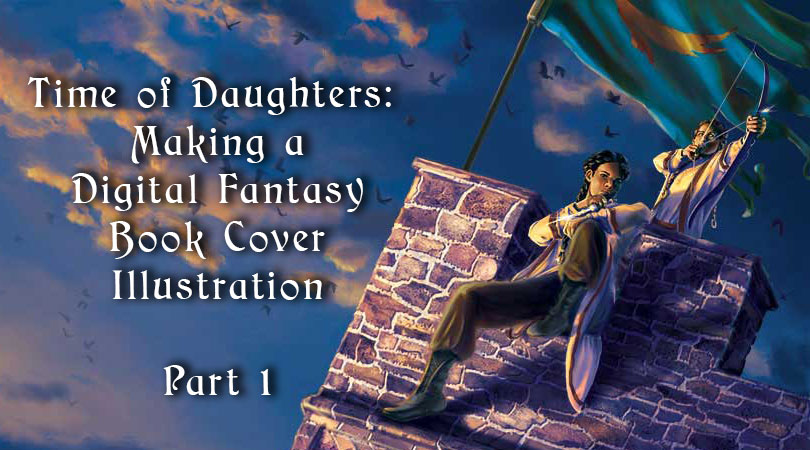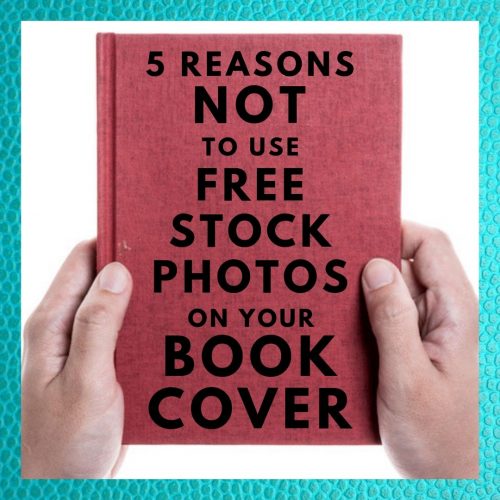
Links: Interview with Me at Productivity Alchemy and Stock Photo Model Posing Ideas from Norman Rockwell
June 17, 2019
Time of Daughters: Making a Digital Fantasy Book Cover Illustration Part 1
July 10, 2019
Stock photos are ridiculously expensive if you don’t buy a large credit pack or a subscription. And there are so many free photos and photos listed under a Creative Commons license on sites like Pixabay, Pexels, Unsplash, and Flickr. Why not save money and use free stock photos on the cover of your book? STOP RIGHT THERE! Here are 5 things you must know before you click that download button.
- The person who uploaded the picture may not own it
- “Creative Commons” doesn’t always mean you can use it commercially
- There’s no model release
- There’s no property release
- You are the person in trouble if there’s a problem
1. The person who uploaded the free stock photo may not own it
Are you sure that the person who uploaded this picture to the website owns the copyright? People grab photos and artwork from websites all the time and post them in other places without permission. (Sometimes they do this to use free stock photo sites as personal image collections.) If you use one of those pictures you can get sued for copyright infringement.
I do a reverse Google image search and a reverse image search with TinEye before I use a picture from a free website or an image listed with a Creative Commons license. That lets me see if it’s available on a pay stock photo site. I find pictures from “free” sites sold on stock sites surprisingly often.
Stock photographers and artists sometimes upload photos to free websites to get publicity for their stock photos, or to give back to the community. To see if that’s the case, I always compare the account names and profile pictures on the free sites to the ones I find on stock sites. If they match, there’s a better chance that the image was uploaded by the owner.
Addendum: July 11, 2019
I didn’t realize that an example of why you need to be careful would show up so soon! Check out my post Stock Photo Horror Story: Why You Should Always Check for Property Releases for an example of an image uploaded by someone who didn’t have permission to upload it. That happened with a REPUTABLE stock photo company. Imagine how much worse it could be with a free one.
2. “Creative Commons” doesn’t always mean you can use a free stock photo commercially
There are several Creative Commons (CC) licenses available, but not all of them allow you to use a picture for free with no other restrictions. Many CC licenses on photos on Flickr and Wikipedia, and on photos found using Google Images, only allow commercial use under an Attribution-ShareAlike license. This means that to use those free images legally you must:
- Attribute the work’s creator
- Provide a link to the license
- Indicate if any changes were made
- Distribute your work under the same conditions as the original if you change or modify it
You’ll need to credit the work’s creator, link to the license, and describe the changes you made to it in the front or back matter of your book. Any work you make using that free image must also be freely distributed under the same conditions as the original. Do you really want to distribute your book cover for free for someone else to use?
To be safe, look for images labeled with a Creative Commons Attribution license. That license only requires proper attribution, and not sharing of your work.
Once you find free images labeled with a CC Attribution license, you should consider points 3 and 4 below before you use them.
3. There’s no model release
Did the people in a photograph give permission for their image to be used commercially? Pay stock photo sites require photographers to have signed model releases, which means that the models gave permission. Free stock photo sites usually don’t. You can get sued if you use a picture of a person who:
- doesn’t want to be associated with your book
- did not give the photographer permission to sell the picture
- didn’t know the photographer was going to upload the picture to the Internet
- did not realize their picture was being taken
Model stock photos for erotica
Erotica authors should be extra-extra careful with stock photos, even with images from pay stock photo sites with model releases available. Many stock sites have licenses or terms and conditions that prohibit you from using recognizable models for products with “sensitive” content. For example, although The Killion Group Images (formerly HotDamnStock) contains a gallery of stock photos titled “Erotic,” their Terms and Conditions page says:
… you agree not to use Images with sensitive topics without The Killion Group, Inc.’s separate written agreement. Such sensitive topics include, but are not limited to: models with mental or physical health issues, social issues, sexual activity, sexual orientation or related, substance abuse, crime or other subjects that can be considered to be offensive or unflattering to any of the models included in the image.
https://thekilliongroupimages.com/terms-and-conditions/
This means you must get permission from the company before you use those photos. Always read the license carefully!
If you buy pictures for your erotica from a stock photo site like (NSFW link!) AdultStockPhoto, you still need to check their terms and make sure that the photos have the correct releases. From their Terms & Conditions:
Although AdultStockPhoto.com makes sure all content has necessary legal documents, we cannot be held responsible for buyer’s 2257 compliance or for infringing upon any laws in those buyer’s Country or State. All images on our site are indicated whether they have accompanying legal documents or not. It is the Buyers’s sole responsibility to notice this prior to purchase.
Buyer beware: if you use a photo that doesn’t have the proper releases, then you are responsible, not the company you bought it from, and not the photographer.
4. No property release
A. Locations
When it comes to photographs, location and structure property rights are hazy. (Disclaimer: I am not a lawyer, and I am not a legal expert.) In the U.S., generally the law says that if you take a photo of a private building or structure while you are on public property, you can use it. Unless…
- the structure is trademarked
- the structure is distinctive
- you are infringing the architectural plans or designs
- the owners want to make as much money as possible licensing the structure’s image and have more money for lawyers than you do.
Essentially, if it’s a recognizable property, you could end up with a cease-and-desist order. An example of this is the iconic Hollywood sign. Take a look at their licensing page. It’s not entirely clear if you can use their sign on your book cover. Are you willing to risk a potential legal battle?
To be safe, only purchase stock photos that:
- contain a property release
- and are not marked “Editorial”
B. Trademarks
Here are some example questions to ask when considering a free photo:
- Does the free photo you want to use contain any trademarks or brand names?
- Is someone holding a Coke can or other recognizable item?
- Is there a billboard in the background?
- Can you recognize the brand of shoes or clothes someone is wearing?
- Is the person in the photo cosplaying a recognizable character?
If the company who owns a brand appearing in a photo objects to you using it on your book cover, then you’re in trouble.
C. Costumed characters
I am also extra-careful when using an image from a paid stock photo site that shows a person in costume. Because some photographers upload pictures of cosplayers wearing costumes of anime characters, and don’t mark them as editorial use only. You can’t use them if the characters are recognizable.
5. You are the person in trouble if there is a problem with a free stock photo
If you accidentally use a free stock photo that crosses one of the lines above, guess who gets the cease-and-desist letter from the lawyer? It’s you. Maybe you’re using the image correctly. But if you can’t afford a stock photo with a property release, can you afford the lawyer to fight it out in court?
If you are going to use a free stock photo, you can and should invest time to research who owns the image, examine the license, and look over the photograph to ensure that there are no recognizable persons, places, brands, or characters in it. You’ll never be 100% sure unless you know the photographer personally but you’ll have done the best you can do.
(Of course, you can always hire me! I buy photos from reputable stock agencies.)



